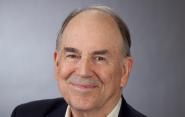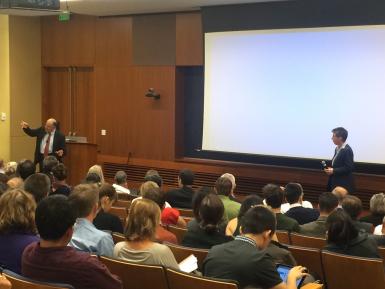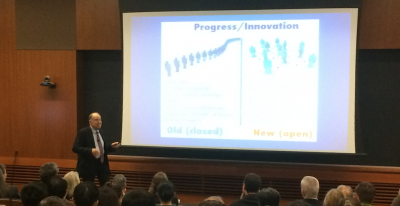John Abele, Founder Of Boston Scientific, Talks Innovation As The Victor M. Tyler Distinguished Lecturer in Engineering

For 15 years, scientists had been searching for the best way to fold proteins. Then came Foldit, an online game that allowed anyone to try their hand at it.
"Three months after this game was put out, some 150,000 people participated, and it was found," said John Abele, founder of of the medical device company Boston Scientific, adding that it was a secretary of a rehab clinic who found the solution.

It was just one of many examples Abele gave as part of his Oct. 1 talk on the kinds of innovations that can happen when people work together and reach out beyond their particular fields. Abele spoke at the Smilow Cancer Hospital auditorium on "Paradoxes and Perspectives on Innovation," as the Victor M. Tyler Distinguished Lecturer in Engineering. Founded in 2010, the Victor M. Tyler Lectureship is one of the signature events hosted by SEAS each year; previous lecturers include famed inventor Dean Kamen, SpaceX and PayPal founder Elon Musk, and renowned light sculptor Leo Villareal.
In her introduction, SEAS Dean Kyle Vanderlick noted Abele's commitment to cross-disciplinary collaboration as a means to innovation. Abele knows of innovation. In the 1970s, he pioneered the then-radical idea of "less invasive surgery." Boston Scientific's innovations with steerable catheters and other devices were often the disruptive kind – "you're going to need a different place to use it, different tools, different knowledge, and it may be done by different people." Because of that, Abele said, these breakthroughs didn't always go over smoothly within the medical establishment. But in the end, Boston Scientific helped reshape public health by bringing to patients more accessible, lower-cost and lower-trauma medical options.
There are a lot of different ways to innovate, he said. And today, innovations are happening faster than ever. He cited a theory of computer scientist and inventor Ray Kurzweil that we are getting exponentially better at innovation.

"What's fascinating is that the acceleration is accelerating," Abele said. There are reasons for that. With the Internet and other technology, we now have incredible access to information and expertise – greater than what a U.S. president had 25 years ago. We can communicate remotely more easily than ever - a 6th grader today has probably already collaborated with people from other countries. That means historians can more readily work with engineers, or surgeons with social scientists
"We need to look at discovery from different perspectives," he said. "This is certainly exciting to me, because it's getting the silos to crash, and it's the sort of thing that Yale is doing today."
With the easy access to information and eroding barriers between thinkers, breakthrough ideas could come from any direction – and could lead to entirely different directions. He noted, for instance, that block chain, the software behind the alternative payment system bitcoin, has "the potential to change capitalism around the world."
Abele is also an educator and a philanthropist. Long committed to science literacy for young people, he serves as vice-chairman of the FIRST Foundation, which runs a range of robotics competitions and other programs as a way to inspire young people to become science and technology leaders. He's also committed to ethics in innovation ("The question isn't what you can do, it's what you should do"), so he was particularly encouraged by a tour of the SEAS facilities, including the Center for Engineering Innovation and Design, where he spoke with engineering students.
"It's really awesome," he said. "I'm hearing not only the interest in technology, I am hearing the interest in values and doing it right."
The talk was co-sponsored by the School of Engineering & Applied Science and the Center for Biomedical and Interventional Technology.

